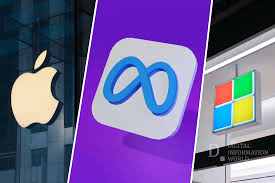Tech Giant Showdown: Google, Apple, Meta & Microsoft Compared Head-to-Head
In the ever-evolving world of technology, a handful of companies dominate the landscape and shape the future—Google, Apple, Meta, and Microsoft. Each has carved out its territory, whether it's search, devices, productivity, social platforms, or artificial intelligence. But in 2025, the lines between these domains are blurring as these tech giants expand into each other's turf. This blog breaks down how each company stacks up across innovation, AI, hardware, enterprise services, user trust, and future readiness. If you want to know who's winning—and where the next wave of disruption is coming from—read on.
5/20/20253 min read


1. Company Snapshots: Where They Stand in 2025
Google: With its Gemini AI model and dominance in search, Android, and YouTube, Google continues to blend advertising, cloud services, and AI research into a powerful tech portfolio.
Apple: A master of seamless user experience, Apple thrives with its tightly integrated hardware-software ecosystem, privacy-first stance, and innovations like the Vision Pro.
Meta: Transitioning from social media to the metaverse and generative AI, Meta has bet big on virtual reality, mixed reality, and open-source AI.
Microsoft: The enterprise powerhouse is leading in cloud, AI productivity tools like Copilot, and gaming with its acquisition of major studios and Game Pass ecosystem.
2. AI & Innovation: Who’s Leading the Future?
Google: Gemini AI powers search, productivity tools, and Android. Its research division (DeepMind) continues pushing AI frontiers.
Microsoft: Partnered with OpenAI, it's embedding AI into every corner of the enterprise world—from Office 365 to Azure.
Apple: Focuses on device-based AI and privacy, with enhancements in Siri, Photos, and on-device intelligence.
Meta: Focused on open-source AI models (LLaMA) and integrating them into WhatsApp, Instagram, and VR platforms.
Winner: Microsoft and Google lead in enterprise and AI R&D. Meta is strong in social AI. Apple is more reserved but consistent in user-first enhancements.
3. Hardware Ecosystems: From Phones to Headsets
Apple: iPhones, iPads, MacBooks, and the Vision Pro form a sleek, interconnected suite.
Google: Pixel phones, Pixel Watch, and Nest devices offer AI-enhanced experiences.
Meta: Quest 3 and Ray-Ban Meta Glasses focus on immersive computing.
Microsoft: Surface devices and HoloLens 3 cater more to business and mixed reality use cases.
Winner: Apple leads in hardware design and ecosystem integration. Meta is bold in AR/VR. Microsoft dominates in enterprise hardware, while Google is catching up in consumer devices.
4. Cloud & Enterprise Dominance
Microsoft: Azure is a leader in cloud infrastructure, offering AI and enterprise tools for developers and businesses.
Google: Google Cloud is growing, known for data analytics and AI-first features.
Apple: Minimal presence in enterprise cloud, focused on consumer services.
Meta: Exploring enterprise collaboration tools via VR, but not a cloud player yet.
Winner: Microsoft reigns supreme in the cloud and enterprise software landscape.
5. Social Influence & Consumer Engagement
Meta: Owns Facebook, Instagram, WhatsApp, and Threads—massive daily engagement.
Google: YouTube dominates video; Search remains irreplaceable.
Apple: Less about platforms, more about experience and loyalty.
Microsoft: LinkedIn for professionals, Xbox for gamers—strong but niche.
Winner: Meta leads in social reach. Google and YouTube remain central to content consumption.
6. Data Privacy & Trust: Who’s Protecting Users?
Apple: Clear leader with a strict stance on user privacy and on-device data processing.
Google: Balancing innovation with privacy controls, though still reliant on user data for ads.
Meta: Rebuilding its reputation after years of data privacy controversies.
Microsoft: Enterprise-grade privacy, compliance, and security protocols.
Winner: Apple wins on privacy perception. Microsoft is trusted by enterprises.
7. Market Valuation & Revenue Streams
Apple: ~$2.5 trillion market cap, driven by hardware and high-margin services.
Microsoft: ~$3 trillion, diversified across cloud, software, and AI.
Google (Alphabet): Strong ad revenue, growing cloud business.
Meta: Advertising still dominates revenue, with long-term bets on the metaverse.
Winner: Microsoft is the most balanced and diversified. Apple remains incredibly profitable.
8. Future Outlook: Who’s Best Positioned for 2030?
Google: Strength in AI and search, but must navigate antitrust scrutiny.
Apple: Playing a long game in health, wearables, and AR.
Meta: Betting on the metaverse and open AI, which could pay off big or fall flat.
Microsoft: Positioned to lead in enterprise AI, cloud computing, and cross-platform productivity.
Prediction: Microsoft and Google are set for leadership in AI and enterprise. Apple will lead in user experience. Meta remains a wildcard.
Conclusion
Each tech giant brings something powerful to the table:
Apple excels in hardware, privacy, and user experience.
Microsoft leads in AI, enterprise, and cloud.
Google dominates search, ads, and is surging in AI.
Meta commands the social graph and is pioneering immersive technologies.
Rather than declaring a single winner, it’s more accurate to say that each is winning in its own domain. The real story is how their paths will intersect—and how users and businesses will benefit from their rivalry.
Stay tuned. The tech wars are only just heating up.
#TechGiantShowdown #GoogleVsApple #MetaVsMicrosoft #AI2025 #CloudComputing #BigTechComparison #DigitalInnovation #FutureOfTech #EnterpriseAI #MetaverseVsReality #PrivacyTech #TheTechInnovative
If you have any suggestion contact us here